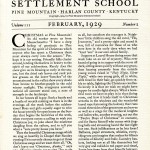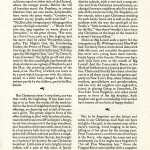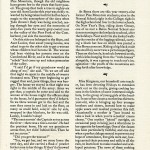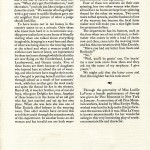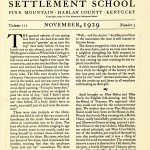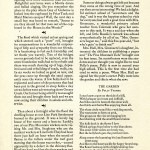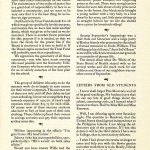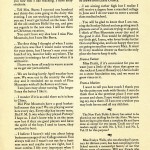Pine Mountain Settlement School
Series 17: PUBLICATIONS PMSS
NOTES 1929
February and November
NOTES – 1929
“Notes from the Pine Mountain Settlement School”
February and November 1929
GALLERY: NOTES – 1929 February
The [Nativity] Play, of which one loves to be a part, which has grown with the school, added to a little here, changed a bit there, written partly by the children, partly by Mrs. Zande.
- NOTES – 1929 February, page 1. [PMSS_notes_1929_feb_001.jpg]
- NOTES – 1929 February, page 2. [PMSS_notes_1929_feb_002.jpg]
- NOTES – 1929 February, page 3. [PMSS_notes_1929_feb_003.jpg]
- NOTES – 1929 February, page 4. [PMSS_notes_1929_feb_004.jpg]
TAGS: NOTES – 1929 FEBRUARY: Christmas, Line Fork, Dr. Ida Stapleton, Rev. Robert Stapleton, Dr. Alfreda Withington, Miss Anna Wulf, Big Laurel Medical Center, Christmas festivities, Aunt Louize, Civil War memories, Berea College, Miss Kingman, household arts, Alafair, Miss Florence Daniels, weaving, Lucille LaVerne, benefit performance in NY, Evelyn K. Wells
TRANSCRIPTION: NOTES – 1929 February
P. 1
NOTES FROM THE
PINE MOUNTAIN
SETTLEMENT SCHOOL
PINE MOUNTAIN * HARLAN COUNTY * KENTUCKY
Copyright, 1929, by Pine Mountain Settlement School
Volume III FEBRUARY, 1929 Number 2
CHRISTMAS at Pine Mountain! An old worker wrote us from Massachusetts: “I have a deep feeling of gratitude to Pine Mountain for the spirit of Christmas which anyone who has spent a Christmas there must always carry into the season.” Perhaps it is our setting. Friendly hills cluster around, lending themselves in beauty to the spirit of our celebrations. Rarely does the snow give us its blessing so early in the season, but the dried oak leaves and rank yellow grasses on the lower “benches” of the mountain and in the valley show every shade from bronze to heather-purple in the cold wintry sunlight. The evergreens scarcely noticed all summer stand out, a note of strength in the landscape.
In our houses all is gay. Such a hustle and a bustle of wreath making as there is in the evenings all the week before the celebrations! Boys and girls equally eager to trim the house prettily for open house on the Sunday that begins the festivities of the week, when everyone comes a-calling to wish you Christmas joy, to joke about the mistletoe dangling from the rafters, and to tell you what a “sure pretty house you have.”
Then the beautiful Christmas songs we sing so heartily in Chapel that Sunday evening! It is our only chance to get at those Christmas songs and we want them all. “Oh, don’t leave out ‘Christians, Awake,” says one. “You’ve simply got to sing “Joy to the World,” says another. “As with Gladness’ must get in,” says a third. Only Mrs. [Louise Will] Browning‘s patience and desire to please make it possible for the Music Committee to satisfy us all, but somehow she manages it. Neighbors’ little children sang the old carol, “Ho, Jeannette,” and a pretty sight and sound it was, full of memories for those of us who were here in the early days when we had “least ‘uns” in our own school family.
Suppers at Laurel House dining room that week take on an air of mystery. Who ever heard of going in to supper with the room all dark, sitting down quietly without any grace, then hearing presently from the outside young voices raised in “Holy Night, Silent Night,” while two young girls, all in white, with tinsel in their hair, go quickly from table to table, lighting the Christmas candles. So lovely it is that we wish we might have supper by candle-light always. What a beautiful room we have to play in in that dining room, and how it lends itself to Christmas wreaths in the windows and the wonderful laurel rope festooning the balcony that runs round three sides of the great room and serves so well as a stage for the medieval knights and ladies who, another evening, act out the “Twelve Days of Christmas” in costume, and for Santa himself who comes with jingling bells and streaming beard the last night but one. Such jollifications as he lets loose! Balloons, paper streamers, whistles, everything you can imagine that makes for fifteen minutes of hilarity and frolic. Laundry baskets, looking not at all like themselves but very gay and rakish in red paper and tinsel, Santa lets down from that friendly balcony. A gift for everyone, and lovely house gifts, — books and games. Someone has been thinking of us on this far side of the mountain, and those of us who are in Santa’s confidence…
[1]
P. 2
…bless you for all! It is a jolly crowd that leaves the dining room, carrying the baskets home to be opened later around the fireplaces in the living rooms.
On the last night of all the Chapel is again gay and festive with a red candle in every window, and the beautiful native stone warmed with the tracery of hemlock boughs. Two tall trees stand on either side of the Chancel, where the manger stands. Behind the veil of branches stand the Prophets, in striped blankets from our own looms. Antiphonally they recite the great words: “Comfort ye, comfort ye, my people, saith your God” . . . “Oh, Zion, that bringest good tidings, get thee up into the high mountain” . . . “Break forth into joy, sing together ye waste places of Jerusalem,” to the great climax, “For unto us a Son is born, unto us a Son is given: and his name shall be called Wonderful, Counsellor, The Mighty God, the Everlasting Father, the Prince of Peace. “The congregation sings the beautiful old hymns, “It Came upon the Midnight Clear,” and “O, Come, O, Come Emanuel,” the lights go off and presently in the dim candlelight just beneath the chancel step we see a group of Shepherds, and the [Nativity] Play, the crowning achievement of the week, is on. The Play, of which one loves to be a part, which has grown with the school, added to a little here, changed a bit there, written partly by the children, partly by Mrs. Zande.
***
But Christmas doesn’t stop there, nor was that really the beginning. It has been coming in to us from the creeks all the week before in the form of neighbors bearing woodsie offerings, so charming and so full of the season’s spirit. The grassy slope in front of the office building is piled with bunches of cedar, rose colored bouquets of Washington’s Bough, lovely bits of moss out of the deep woodland, pine branches all trimmed with cones, bunches of sycamore balls tied up with string, red pokes full of black walnuts and here a neighbor, more practical than the rest, has brought us a bucket of lye hominy for our Christmas breakfast. Little piles of corn, bright red and yellow, add a note of rich color. A family group comes with a new baby who “hain’t never been abroad before,” the father bringing a beautiful grey wasp’s nest for Miss [Katherine] Pettit, and some ears of red corn to feed the “red-birds” with. “Hit’s give out,” he said, “what a shine you cut up over a humming bird’s nest. I aim to keep on a-lookin’ till I find it for you.”
***
And over on Line Fork the Stapletons are carrying Christmas out into the homes and district schools, with a tree and a song service and little Christmas remembrances exchanged between neighbors who live side by side all the twelve months. Dr. Stapleton, on her rounds, takes a gay Christmas stocking for each lonely home and is told as she sympathizes with the way the small girl of the family’s “little hunkers is all drawed down by the ‘flu,” that there “wouldn’t have been any Christmas at the head of the branch if it weren’t for you fellers.”
Down at Big Laurel such a party for the youngsters as Dr. [Alfreda] Withington and Miss [Anna] Wulf had! Certainly Santa remembered them with dolls this year, and certainly the good saint has never seen young faces more incredulously happy at his bounty. Never ever have such dolls been seen at the mouth of Big Laurel! And the Community Room at the Medical Settlement is a joyous place for parties. There could hardly have been a lovelier one in it all these years than the grown-ups’ party on New Year’s Day, when fathers and mothers, grandfathers and grandmothers, and one very old neighbor over eighty-five, joined in playing Going to Jerusalem, Do You Like Your Neighbor, and other round games in front of the big fireplace. Such laughter and good comradeship in lives that have known all too little of happy frolics!
***
Not to be forgotten are the letters and cards in our Christmas mail from old boys and girls. One girl, in the second year of her nurse’s training, wrote longing to be here, telling us of her plans for the coming year. From Tunis came a card from one of our boys in the Navy, who signed his name and put underneath (as if we might have forgotten!) “An old Pine Mountain boy.” From the Yangtse [sic, Yangtze] River came another with a snapshot of “My ship” tucked into the pidgin English Chinese Christmas card. Perhaps these things touched us most. That Pine Mountain is the place at home to which their hearts…
[2]
P. 3
turn at this season of the year is our chiefest Christmas blessing in this rich Christmas-tide.
***
Carrying trees at Christmas to our older neighbors is a custom which still obtains at Pine Mountain, though the old neighbors have grown few in the years that have passed. The group that took a tree to eighty-six year old Aunt Louize this year was richly rewarded by being taken back for half an hour’s magic to the atmosphere of the days when John Brown’s Body was being enacted; seeing through her eyes and the memories of sixty-five years the weary grey-coated men in the valley of the Poor Fork of the Cumberland, yon side the mountain.
On this side one belonged to the blues, and Aunt Louize, then sweet young Louize, was asked to go to the other side to get a woman whose children had become ill. The woman had been visiting her parents over on the Cumberland River, and in the meantime the “rebels” had come up and taken possession of the valley.
“I said I’d go if my grandmaw would go along of me,” she said. “So we set off and that night we spent in the middle of twenty thousand men. They were beginning to get ragged then and, poor things, they was hungry. The house we stayed in that night was right in the middle of the army. Atter we got thar, a captain he come and said to the woman of the house might the officers sleep in the house, he’d guarantee they’d behave. So we three women got in the bed and the men they come in and laid on the floor, as many as could hold, a-layin’ side by side, wropped in thar blankets, for hit was cold. Lawsy, I couldn’t sleep!
“The next mornin’ the Captain sot us across the river — there was a tide a-runnin’. He had the prettiest horse. He sot my grandmaw across first, her ridin’ behind him. Then he sot me across.”
“Did you get the woman?”
“Yes, we got her, and we come home the next day, and she carried a flask o’ powder for her man in her things. If they’d a knowed we’d a-had that, they’d a-killed us. Nary an oncivil word we had from any o’ them soldiers, but, laws, I couldn’t sleep with all them thousands o’ men a-layin’ round.”
“And the end came,
And the grass comes
And the wind blows
On the bronze book
On the bronze men
On the grown grass,
And the wind says
‘Long ago, long ago.’ “
***
At Berea [College] there are this year twenty-nine former Pine Mountain students; nine in the Normal School; eight in the College; eight in the high school and four in the lower schools. On New Year’s Day, riding down Greasy, one of us met a Berea Normal School student returning to the lowlands to school, after the holidays. Neat and trim she looked walking the trestles of the logging railroad, carrying a black hat box on which was pasted a blue Berea pennant. Riding a big black mule the small boy escort was a picturesque figure. There on this lonely, hemlock-bowered creek, with icicles hanging from the “rock-houses” alongside, it was a group to touch one’s imagination — the youth of the mountains setting forth after knowledge.
Miss [Marian] Kingman, our household arts teacher, has been devoting Fridays to extension work out on the creeks, giving cooking lessons in the kitchen of some interested neighbors, to the group of young girls of the locality. In one of her classes a motherless thirteen- year-old, who is bringing up four younger brothers and sisters, learned how to make apple sauce and mashed potatoes this fall. Occasionally a mother is “just bound to take a look in when you’re a-makin’ cream cheese.” One mother “joined” outright, an occasional peep in being just a whetstone to her appetite for knowledge. One of the classes has been particularly faithful, and one day when a perfect deluge seemed to prevent any hope of attendance, five girls were out, having carried their potatoes and milk in all the rain, to learn how to make mashed and scalloped potatoes. The news of these cooking classes has spread to a creek five miles away and Miss Kingman had a caller from this creek, a woman who asked her to come over and start a class for mothers in her kitchen…
[3]
P. 4
…so they could learn to “fix things like Pine Mountain learns you.”
***
Alafair, the horse of the weaving teacher, Miss [Florence] Daniels, has seemed very gay since she got her green saddle blanket with red pipings and a red star in each of the two back corners. “When she’s got that blanket on,” said the maker, “you look jest like a judge a-ridin’ down the creek.” We wonder what legal light with a gay taste in saddle blankets gave our old neighbor that picture of what a judge should look like.
To have looms out in ten homes in the country seems to us a miracle. Only those who know how hard it is to introduce anything new realize how many hours of friendly visiting when one talked about everything imaginable, bringing in a word here and there of what was being done in the weaving room at the school and what a woman could do with her own loom at home, are represented by these ten looms through which the shuttles are now flying on the Cumberland, Laurel, Leatherwood, and Greasy creeks. Five of these looms are there because of daughters who learned here at school the art of weaving, and who in turn have taught their mothers. One girl is putting herself and her sister through school as a result of her summers’ work, while her mother gets the wool ready and spins the thread for her in the winters. Best of all, it was her brother, one of our old boys, who gave Delphia her loom. Another of these looms is in the home of an old girl who has just married and set up her own place. When she was here she was one of Miss Daniels chief helpers in the weaving room. Two older women have revived this art of their youth through the extension work of this department. In another home an old woman and her invalid son are both weaving, the son having made the loom. Miss Daniels rode over one day to show him how to set up the warp and he has made his first blanket. At the head of a creek half a day’s trip away, a woman whose husband was shot, is supporting her three children largely by the fruit of her loom. She learned all she knows from our weaving teacher.
Four of these ten weavers do their own spinning, but two other women who themselves have no looms are kept busy spinning thread for the other six women. Two more make tufted spreads, and the husband of one of the weavers has become the local loom maker and will make you a nice light loom for seventeen dollars.
The department has its humors, such as the time when one of our craftsmen, a chair- maker who comes in with a load of chairs now and then, came into the weaving room and has this conversation with Miss Daniels: “Have you had ary letter from Sears and Roebuck?”
“No.”
“Well, you’ll be gettin’ one. I’m buyin’ me a new cook stove from them and they ask me the name of my employer. I give yourn.”
We might add that the letter came and that this neighbor has his cook stove!
***
Through the generosity of Miss Lucille LaVerne a benefit performance of Sun-up was given for Pine Mountain in New York in January. A committee of old Pine Mountain workers, headed by Miss Evelyn K. Wells, worked very hard to help make this performance the success which it was. Miss LaVerne is known internationally for her wonderful acting in this very interesting play of southern mountain life and character.
[4]
The Marchbanks Press, New York
GALLERY: NOTES – 1929 November
…[A]bout a fortnight after the flood the dwelling house at our Line Fork Settlement burned to the ground.
We are going to have more light and power just as soon as we can decide whether it is wiser to build the two mile line over the mountain or whether we should put in a Diesel engine of our own….
- NOTES – 1929 November, page 1. [PMSS_notes_1929_nov_001.jpg]
- NOTES – 1929 November, page 2. [PMSS_notes_1929_nov_002.jpg]
- NOTES – 1929 November, page 3. [PMSS_notes_1929_nov_003.jpg]
- NOTES – 1929 November, page 4. [PMSS_notes_1929_nov_004.jpg]
TAGS: NOTES – 1929 NOVEMBER: Dr. Alfreda Withington‘s clinic, smallpox, Dorothy Bolles, Mary Gould Davis, commencement play, flood, burning of Line Fork building, summer school, Mrs. Greenacre, children’s newspaper, Pine Mountain Echo, student poem, Electricity Trust Fund, Diesel engine vs. line over mountain, summer school, Fair Day, Governor visit, Dr. White, dental clinic, Gladys Hill, Miss Marguerite Emerson, Ruth B. Gaines, Mrs. Martha Burns, NY Public Library, Evelyn K. Wells, letters from alumni
TRANSCRIPTION: NOTES – 1929 November
P. 1
NOTES FROM THE
PINE MOUNTAIN
SETTLEMENT SCHOOL
PINE MOUNTAIN * HARLAN COUNTY * KENTUCKY
Copyright, 1929, by Pine Mountain Settlement School
Volume III NOVEMBER, 1929 Number 3
THE general opinion of our spring was that no one had ever seen the mountain “greenin’ up so near the top” that early before. It was too lovely not to stir abroad, and a visit to Dr. [Alfreda] Withington‘‘s clinic on White Oak Creek gave legitimate vent to one’s wanderlust. “Aprile” had come and set her fugitive foot upon the mountains, and as she touched them the dogwood and red-bud had blossomed out into snow white and an indescribable riot of raspberry color. The hills were simply a bower of beauty. One never imagined so much blossom in the world, and one was sorry for the world that had never ridden down Greasy on an April morning. “I’m up in forty-five,’ said a friend at whose fence we stopped to pass the time of day, “and I hain’t never seed so many different blossoms out all at one time before. If a body didn’t have to work, you could just sit and view the mountain.”
There were nine patients at the clinic, which was held in one of the two rooms of a farmhouse by the creek. Small-pox was all about so vaccination was to be done. The host who had seven children ranging in age from sixteen years to one month, could not bring himself to venture these untried waters of science for them. His sister, who had her brood of five done, tried to persuade her brother, warning him that the small-pox “puts your eye out” sometimes. We were sitting by when she went to her sister-in-law, who was nursing a month-old baby. “Doctor wants to know if you want to have the children done?” “Have you asked him?” “Yes. He says no.” Pause. A meaning look at the other woman, a reluctant smile — “Well, — tell the doctor.” Audible proof that in the mountains the man is still master in his own house.
The doctor stopped to visit a sick woman on the way down, and as we rode near home a neighbor ploughing his field stopped to “holler” across the creek to the doctor that he was coming up next morning for his typhoid inoculation.
A sickle moon lighted us the last five miles home while we thought of the beauty of the day just gone and the beauty of the work done by our “stout” doctors and nurse, who ride the creeks up and down in all weathers with healing as their gift.
***
April brought us Miss [Dorothy] Bolles and Miss Davis for English folk-dancing, and May the Board of Trustees. We regretted that they could not wait for the commencement play. We wished that every Pine Mountain friend could have been at the House-in-the-Woods that lovely May evening when Robin Hood, really beautifully produced in a natural Sherwood Forest setting, seemed a perfect climax to the year’s labors. Miss [Margaret] Motter, our school principal, and Miss [Harriet] Crutchfield, one of the teachers, put much of themselves into this production and it was a thing of beauty for us all to remember. The costumes deserve a story in themselves. Old sheets, the dye-pot, a lovely illustrated Chaucer given to the Library by Miss [Elizabeth] Hench, which stood open before Granny Creech while she cut and sewed, all figured in their creation. There were gorgeous purples and greens that even the bright electric lighting with which the wood was illuminated, thanks to the boys’…
[1]
P. 2
…work, did not detract from or accuse of being muslin. We shall long remember that first act with the soft light of evening the only illumination and a chorus of song from the birds whose woodland had been invaded by our “Merry Men.” A debate is on to decide whether the last two acts with the artificial lighting were more beautiful than the first. Delightful entr’actes were a Morris dance and ballad singing. Do you remember the place in the play where Guy of Gisborne is locked into the cupboard by Friar Tuck and Maid Marian escapes? Well, the next day a small boy was heard to remark, “Seems to me they should let that man out of the cupboard in the House-in-the-Woods!”
***
The flood which visited us last spring and which seemed such a “pure” evil, brought its compensations in a wonderful outpouring of help and sympathy from our friends. It is heartening to feel such friendship and we thank you warmly. Two of the bridges on our grounds had to be replaced, even the stone foundation walls had to be rebuilt and there was much cleaning up of logs, deposited sand and rebuilding of roads, walls, etc. In six weeks we looked as good as new, and the peas came up through the sand apparently none the worse. A few fields had to be replanted and some of the potatoes that had been put in the ground in steep fields a day or two before went adventuring down Greasy Creek. Our farmer being a thrifty man sought them out and brought them back and we are now eating their children in salads and otherwise.
***
Then about a fortnight after the flood the dwelling house at our Line Fork Settlement burned to the ground. It was a lovely log house of five rooms and a lean-to. Luckily two of our Pine Mountain workers were visiting Mr. and Mrs. Stapleton who are the resident workers at Line Fork. They had been there just half an hour when the sound of flames in the rafters under the roof gave warning that the house was on fire, — caused apparently by a defect in the chimney flue. Working hard and fast the four workers and two neighbors who saw the flames and came to help kept the fire in abeyance long enough to enable the Stapletons to save most of the furniture. Then the well ran dry and nothing more could be done to save the house. The new house is also built of logs and you will be interested to know that it was replaced out of insurance and a generous contribution of $500 by the Stapletons themselves. The house-warming in September was a great occasion on Line Fork.
Summer doings always get left out because they come at the wrong time of year. And yet they are so interesting! We had a delightful summer school of “seventeen and the dog,” and it was the happiest school to visit for everyone had such a good time with Mrs. Greenacre, a wonderful primary school teacher from Colorado who gave her summer to this task. It was a sad day when she left, and little Rosalie‘s remark was echoed sympathetically by all of us. “Mrs. Greenacre begun me,” said this five-year-old, “but who’s goin’ to finish me?”
Mrs. Hall, Mrs. Greenacre’s daughter, interested the children in publishing a paper and “The Pine Mountain Echo” brought out its first issue. Its contributors were the students and we thought you might like to read Polly‘s poem. Polly is now in second year high school. This is the first time she had tried to write a poem. When Mrs. Hall assigned her the poet’s corner Polly went into the garden and this is what she saw:
THE GARDEN By POLLY TURNER
I once knew a spot on the side of a hill,
With larkspur and roses and daffodil,
And lilies and iris beneath the stone wall,
And birds and butterflies enjoying them all.
The vines circle round like a wedding march,
The roses meet to form an arch,
The grapes on the vine are hanging low
And chatting with the small flowers below.
The hollyhock is the flower I love
Which springs from below to the blue above.
The sweet little violets are lovely too,
But the hollyhock gets the prettiest view.
Along comes the humming bird and hums his sweet song
And flies to the honeysuckle for happy hours long.
The flower looks up with a bright shining face
And greets the tiny bird with a lady’s grace.
***
We are going to have more light and power just as soon as we can decide whether it is wiser to build the two mile line over the…
[2]
P. 3
…mountain or whether we should put in a Diesel engine of our own, of adequate horse power to take care of present and future needs. There is so much to consider that we feel we must make very sure what will be wisest in the long run, and we are finding out all we can about Diesel engines. They have been much commended for our needs. The maintenance of two miles of power line is a good deal of responsibility to face in so isolated a community, and we want to be very sure that it is the best thing for us before we sign contracts.
Our Electricity Trust Fund shows $1821.08 which was given specifically for this purpose, and besides this we have laid aside another $2000, which was given to be used as we determined. There is another $1000 promised for this purpose if it is needed, so that we have the funds for the power line if the Board is convinced it is best to build it. If the Diesel engine seems best the Trust Fund will probably meet that expenditure.
We appreciate the generosity of all those concerned, you who have made meeting this need possible and the Kentucky Utilities Company who have waited so patiently for us to satisfy ourselves of the best plan for the school.
***
The group of children who stay to do the summer work do so largely to earn money for their winter’s expenses. This summer ten of them not only paid off their debts on last years schooling, but saved among them $295 towards expenses of 1929-30. A year’s cash expenses total about $25.75 for each child. Of course most of these summer students also have to buy at least part of their own clothing. These children placed their money in savings accounts and pay their expenses as they come due.
***
William (appearing in the office): “I’m goin’ home. My head’s risin’.”
Johnny (who has accompanied him, sympathetically): “Hit’s a-risin’ on both sides of him.”
Would you have known Willie had the ear ache?
***
Our Fair Day came late in September, and Miss Kingman, remembering last year, ordered seventy-five gallons of ice cream.
Everybody knowing that the logging train would not carry this freight again till next July Fourth decided to do their worst, or best!
It was a wonderful day: speeches, contests, tug of war, a basketball game, folk-dancing, milking and bed-making demonstrations, handcraft, poster exhibits, not forgetting prizes at the end. There were enough pretty babies for us to talk about a baby prize some time in the future. One black mule brought a young mother with a tiny baby in a blue shawl in her arms, and little sister sitting up so straight behind her we felt she should have a prize for horseback riding!
***
Among September’s happenings was a visit from our Governor and a large party of Harlan friends who presented to the school a framed memorial to Uncle William [Creech]. This will hang in his old home, “Aunt Sal’s House” as we call it, which now stands on our grounds as a reminder of pioneer life.
The dental clinic when Dr. White of the State Board of Health stayed with us for several weeks and did much work for our children and those of our neighbors was another event of September.
***
LETTERS FROM OLD STUDENTS
. . I never shall forget Pine Mountain and all of its good teachings. My husband says that he can say lots of good things about the school, concerning cooks, as I learned what I know over there. Hail! to Miss [Emily] Hill and Miss Emerson.
. . Well, I am debating again next Saturday night. The question is: Resolved, that the United States should grant independence to the Philippine Islands. I am taking the affirmative side of the question. If I win this debate it will be the third debate I have won in College, that is, inter-society debates.
. . I wish I had about two weeks or longer to come and help you with the flower garden and other work there is to do. Really, I think I had rather scrub the living room porch more than anything else, or spend a day in the laundry with you.
Miss [Ruth B.] Gaines, I don’t think any of the Pine Mountain boys and girls appreciate what Pine Mountain has done for them until they…
[3]
P. 4
…have gone away for a while. I think I have spent my happiest days there. It doesn’t seem like it has been six months since I was there last summer canning beans with you all.
Oh, I forgot to tell you tomorrow is my first pay day for teaching. We teachers are going to town in the morning. I must tell you how well I like teaching. I have sixty students.
. . Tell Mrs. [Martha] Burns I counted one hundred and thirty-five cows going to the dairy this evening. I am not working at dairy work, so you see I won’t get kicked on the nose. Tell all the old students Hello! for me, and give my regards to the new ones. I will see them at Christmas vacation.
You can’t have any idea how I miss Pine Mountain, but I sure like Berea.
. . The first thing I thought of when I came down here was that I would make wreaths for sister, but I haven’t seen even one your bunch of ivy, laurel or holly anywhere. The country is missing a lot of beauty when it is without it.
I have my loom all ready to weave as soon as we get our yarn colored.
. . We are having lovely April weather here now. We were out in the country the other day and it reminded me so much of Pine Mountain with all the flowers and trees.
I am just crazy about nursing. The longer I stay the better I like it.
. . I wonder if it is as cold there as it is here in China.
Did Pine Mountain have a good basketball season this year? We are playing soccer here every day. Every ship has its own team. Did P. M. S. win when they played Putney? I hope so. I don’t know who is on the team now but if they are good players and have the spirit of the boys I used to know, they are hard to beat.
. . I believe I haven’t told you about being business manager of our College annual. You always told me I wasn’t cut out for a business man and maybe you are right, but I must confess I felt very important when I was selected for the position. I finally got about $325 advertising, which enables us to come out financially.
Now that I am about to get a degree I of course wonder what would have happened had I not come to Pine Mountain. I would have gone somewhere and gotten a certificate (to teach) and maybe stopped, who knows? It is hard to say what would have happened but I’m prone to think I would have been in less desirable circumstances. I am truly grateful for the training I received at Pine Mountain. I hope more pupils will be drawn from Leslie County.
. . I am aiming rather high but I realize I will receive a degree from a standard college in June and I do not want to enter a second class medical school.
. . You will be glad to know that I am running the Sunday School and am getting much pleasure out of it, and am trying to do good. I think of Pine Mountain every day and of the good it did. You would be delighted in my little girl, Izena, who loves books better than anything else, and is so happy that you are going to send her one every May. It must fit in my machine drawer as that is the only place she has to keep it safe.
From a Father:
Miss Pettit, if it’s convenient for you we want just a little of the vines that grow on the rocks at Laurel House [ivy]. Ours is built on a stone foundation too, and we want to grow vines on it.
From a Mother:
I want to tell you how much I thank you for the pains you took with Gracie. I sure do think that is the prettiest place I ever saw so neat and clean. I sure would enjoy spending my days there. If I am ever a widow you may look for me and all my children.
***
The New York Public Library has asked to be placed on our mailing list for the Notes. We have been trying to give them a complete file and have done so except for two issues. Could any of our readers supply us with No. I, Vol. I and No. I, Vol. II for this purpose?
***
Miss Evelyn Wells, who was the school’s secretary for thirteen years, has been compiling for the School records a manuscript history of our first fifteen years of existence. Will any friends who have early letters from the school (not printed literature, which is available here, but personal letters), who are willing to lend them to Miss Wells, please send them directly to her at 70 Oak Ridge Avenue, Summit, New Jersey. Miss Wells will keep them only long enough to make copies.
[4]
The Marchbanks Press, New York
Previous:
NOTES – 1928
Next:
NOTES – 1930
See Also:
Drama GUIDE
EVENTS Christmas at Pine Mountain Settlement School GUIDE
Medical GUIDE
WEAVING Arts and Crafts Weaving GUIDE
WELLS RECORD OF PINE MOUNTAIN SCHOOL Guide 1913-1928
Return To:
NOTES Index

